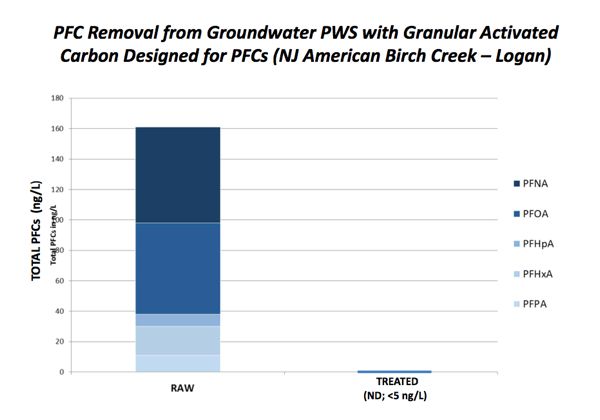Why Is Advanced Treatment Not Required for NJ Drinking Water?
Why is DEP allowing millions of NJ residents to be needlessly – and unknowingly – exposed to hundreds of toxic chemicals when there is treatment technology available to remove them?
[Update below]
I wanted to post the above chart and excerpt below from a new DEP report presented to the Drinking Water Quality Institute (DWQI) earlier this week in order to make one critically important point that is being lost in the media coverage and over all debate about the DWQI.
An it is shocking that DEP’s “asset management” Guidance and the infrastructure deficit debates ignore needs for upgrading treatment.
Several years ago, DEP, US EPA, and the US Geological Service found that there are over 500 unregulated chemicals present in NJ drinking water. For details, see this PEER Report:
Trenton — New Jersey should filter its drinking water to remove hundreds of chemicals, most of which are unregulated, from its drinking water supply, according to a rulemaking petition filed today by Public Employees for Environmental Responsibility (PEER). The plan to screen many chemicals out of tap water was actually developed by the state Department of Environmental Protection (DEP) but has been in limbo for the last six years.
State testing has detected “approximately 600” chemical compounds “in 199 samples collected” including five brands of bottled water, according to a recent DEP white paper. The vast majority of these chemicals, including pharmaceuticals, hormones, and cleaning products, are not regulated by either the federal or state government. As a result, there is no regulatory effort to reduce or eliminate them from drinking water.
The April 2010 DEP white paper, entitled “Investigations Related to a ‘Treatment-Based’ Regulatory Approach to Address Unregulated Contaminants in Drinking Water,” advocates used granular activated carbon filtration and other techniques to remove most chemicals in drinking water, noting that carbon filtration alone removed more than half of identified chemicals.
These chemicals are unregulated. Health effects of exposure to these chemicals are unknown, especially for children and the developing fetus. They are not removed by what is called “conventional treatment” that is installed at NJ drinking water systems.
But there are advanced treatment methods that can remove almost all of these chemicals to “non-detectable” levels.
PEER recently petitioned DEP to impose regulations to mandate advanced treatment of NJ drinking water systems that are highly vulnerable or have known contamination by unregulated chemicals.
The Christie DEP denied that petition. See:
PEER’s concerns and the case for installing advanced treatment was made stronger by a DEP report posted on DEP’s website today. Some of the key findings of the Report was presented to the DWQI earlier this week and the full Report was posted on the DEP website today.
According to the Report, available data strongly suggests DEP should begin to require advanced treatment at certain vulnerable water supply systems.
The DEP Report found:
PFCs are removed from drinking water by granular activated carbon and reverse osmosis (Rahman et al., 2014), while the standard treatment processes used at the sites included in the 2006 and 2009 studies do not effectively remove PFCs. Data on PFCs in raw and finished water from several sites included in the 2006 and 2009 studies confirms that PFC concentrations are generally not decreased in the finished water (Post et al., 2009, Post et al., 2013b). …
In addition, to better understand treatment options available for the removal of unregulated organic contaminants, the Department is studying the effectiveness of granular activated carbon (GAC) removal technology in removing unregulated contaminants, including PFOA and PFOS, in pilot studies at two water systems that use groundwater: Fair Lawn Water Department (Bergen County) and Merchantville-Pennsauken Water Commission (Camden County). These pilot studies are currently ongoing.
Why is DEP allowing millions of NJ residents to be needlessly – and unknowingly – exposed to hundreds of toxic chemicals when there is treatment technology available to remove them?
It appears that DEP is refusing to do so based on alleged high cost of these treatment systems.
How much are you willing to pay to drink healthy water?
[Update: 5/5/14 – I focused on treatment issue as a solution, but Jon Hurdle at NJ Spotlight writes a superb story about how DEP suppressed this study for 4 years, see:



Pingback: christian louboutin outlet store
Pingback: arsenal goalkeeper jersey 13 14
Pingback: christian louboutin replica
Pingback: cheap prada
Pingback: maillot officiel de manchester united
Pingback: maillot italie collector 1982
Pingback: nouveau maillot marseille jean
Pingback: roshe run trainers mens
Pingback: camisetas u de chile retro
Pingback: when does the new arsenal shirt come out
Pingback: camisetas originales de argentina
Pingback: nike roshe run hibits
Pingback: christian louboutin replica
Pingback: ajax showt nieuw uitshirt
Pingback: camiseta naranja fc barcelona
Pingback: manchester united jersey xl
Pingback: roshe womens flyknit
Pingback: couleur maillot inter milan
Pingback: maillot de foot france 4 ans
Pingback: camisetas de hockey madrid
Pingback: christian louboutin outlet store
Pingback: fitflop uk
Pingback: フェンディ アウトレットモール
Pingback: rolex watches uk
Pingback: liverpool shirt age 10
Pingback: camiseta lecce italia
Pingback: camiseta barcelona 2014 costa rica
Pingback: Rebirth
Pingback: WolfeNotes.com » The NJ Drinking Water Quality Institute Is Ignoring Pharmaceuticals, Endocrine Disruptors, and Hundreds of Toxic Chemicals They KNOW Are In Your Drinking Water
Pingback: WolfeNotes.com » Murphy DEP Commissioner Was Victorious Lawyer For A Chemical Company In Precedent Setting “Major Loss” That Gutted DEP Natural Resource Damage Program
Pingback: WolfeNotes.com » Chasing Toxic Unicorns In Woodbridge, New Jersey
Pingback: WolfeNotes.com » Important Aspects Of The Alleged NJ Colonia High School Cancer Cluster Story Are Being Whitewashed
Pingback: WolfeNotes.com » DEP Completed The Study Required By Senator Smith’s “Forever Chemicals” Bill A Decade Ago
Pingback: WolfeNotes.com » It’s Not All Good: Murphy DEP Chemical Industry Lawsuits Are Masking Litigation And Regulatory Failures